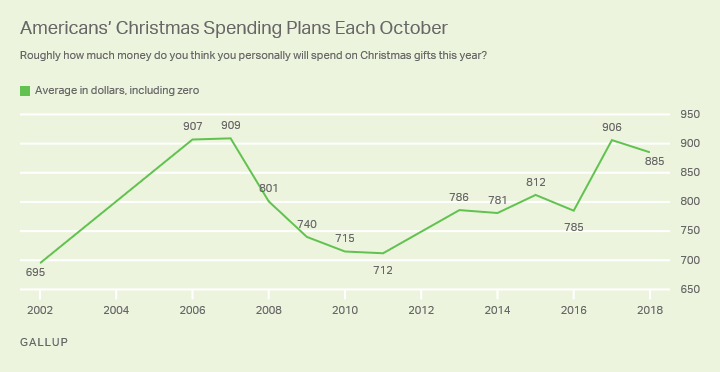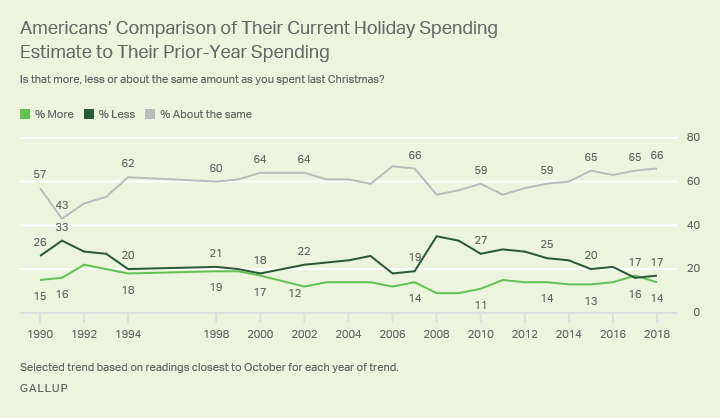Story Highlights
- Americans predict spending $885 on gifts this holiday season
- Prediction is just slightly lower than last year's strong level
- Rosy picture is underscored by few planning to spend "less"
WASHINGTON, D.C. -- Heading into the 2018 holiday season, Americans' prediction for the amount they will spend on Christmas gifts is fairly robust, nearly matching the decade-high level recorded a year ago. U.S. adults currently estimate they will spend an average $885 on gifts this year. That's a bit lower than the $906 recorded in October 2017 but is higher than any other October holiday spending projection in Gallup's trend since the 2007-2009 recession.

According to U.S. Census retail spending statistics, consumer spending (both in store and online) in the department store/general merchandise category rose an average 3.9% in November and December 2017 compared with the same months in 2016. That was the largest year-over-year increase in such spending since 2006. More broadly, all retail spending, including in restaurants and grocery stores, was up 6.5% last holiday season, the highest since 2005.
Although Americans' Christmas spending estimate is down from last year, that doesn't necessarily mean spending will be lower. According to ���۴�ýmodeling of how this measure has related to actual retail sales, historically, it portends another strong year. However, this depends on whether consumer spending intentions remain in this range in Gallup's next reading, in November. Spending could be affected by shifts in economic mood if the stock market undergoes significant changes between now and December, as well as any psychological impact of the Nov. 6 midterm elections.
The latest poll was conducted Oct. 1-10. The $885 spending mean reflects the finding that 33% of Americans plan to spend at least $1,000 on Christmas gifts, 22% say they will spend between $500 and $999, 29% will spend between $100 and $499, and 3% will spend less than $100.
Eight percent of U.S. adults report they won't spend anything on Christmas gifts, which includes those who say they don't celebrate the holiday. Another 5% are unsure how much they will spend.
Relatively Few Plan to Spend Less Than Year Before
A separate question in the poll also suggests Americans are poised to maintain last year's elevated holiday spending level. When asked how their expected spending this year compares with 2017, 66% say they will spend the same amount, while nearly as many say they will spend more (14%) as say they will spend less (17%).
There have been only a handful of times in Gallup's trend since 1990 -- in 2000, 2006, 2007, 2017 and this year -- that fewer than 20% of Americans have said they would be spending less on gifts than the year before. Rather, since 1990, nearly twice as many U.S. adults, on average, have said they plan to spend less on gifts (26%) rather than more (14%), while 58% have said they plan to spend the same amount.

Implications
If Americans' holiday spending intentions remain stable in the event of further stock market volatility, disruption of trade, the outcome of next month's midterm elections and other potential threats to consumers' mood, retailers could enjoy back-to-back banner holiday retail seasons, a first since the mid-2000s. These are, of course, a lot of big "ifs."
Regardless of the dollars spent, the high percentage of Americans planning to spend any amount of money on Christmas gifts -- 87% -- highlights the continued cultural as well as economic importance of this tradition.
View complete question responses and trends.
Learn more about how the works.




